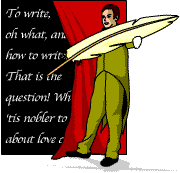Pushing the envelope
Created | Updated Jan 6, 2013
Words, words, words. That's what we're made of. Herewith some of my thoughts on what we're doing with them.
Writing Right with Dmitri: Pushing the Envelope

Where does that phrase come from, anyway? What envelope are you pushing? This has always bothered me, because I don't like to give stationery a hard time.
It turns out the term is mathematical in origin. Who knew? A mathematical envelope is defined as 'the locus of the ultimate intersections of consecutive curves'. So now we know.
The phrase 'pushing the envelope' was popularised by novelist Tom Wolfe in his 1979 book The Right Stuff. He was talking about astronauts, naturally. They pushed the 'flight envelope'. Soon all of us were trying to push our own envelopes – to extend the boundaries of what could be. How does that affect our writing?
We don't want to stay within the tried-and-true, formulaic limits of our craft. On the other hand, we don't want to lapse into incomprehensibility – an ever-present danger for some of us. Particularly me. An editor friend of mine once exclaimed, 'You make more intuitive leaps in your logic than Louis Farrakhan!' That is obviously not a good thing, so I try to tone it down. But how do we keep ourselves from becoming stale and preaching to the choir?
Here, I think, are a few tips. See what you think about them.
- Learn new things.
- Exercise virtual empathy.
- Remember to keep one foot on the ground.
What I Mean (I Think)
1. Learn new things.
One reason we get stale is because we find ourselves talking about the same issues over and over, from the same point of view. That's because, by a certain point in life, we may have accidentally stopped learning. We need to get out of the rut.
Do you remember the Monty Python sketch about the Confuse-a-Cat service? The Python people came out and entertained a cat to help it escape its ennui. Maybe you need to pretend to be that cat, and let yourself be confused.
Read about something that would not normally interest you. When somebody says, 'People in New Jersey have an annual contest to see who can hurl a pumpkin the farthest using a home-made trebuchet', don't reply, 'All Americans are idiots who play with their food.'
Go and investigate. In the end, you may still feel, with some justification, that all Americans are idiots who play with their food. But you might have got an idea for a short story.
2. Exercise virtual empathy.
Nobody's asking you to believe. Just pretend you do, just for a few minutes. All writing consists in the end of constructing a thought experiment. That's what a parable is, or a poem, or a joke, even – a thought experiment. You need to suspend disbelief before you can expect others to do so.
Don't be so quick to engineer a conclusion, either. Try to walk a mile or two in the other person's Reeboks, and see where his/her feet go. Then describe what you see through your eyes. It might be fun.
3.Remember to keep one foot on the ground.

While you're empathising, be careful not to get carried away. I'm a bit of a method actor when it comes to writing, myself, and I can get lost in the other fellow's point of view. Keep in mind: you're going to have to explain this to a reader. And the reader may be skeptical.
Put it this way: you've been to the mountain. From there, you can see great vistas. Now go back to the crowd on the plain, and try to explain it to them. Remember where they're standing, and find the words that let them see what you've seen.
Don't be afraid to try new tricks – just be sure you let the reader in on the magic.
When you find out something cool, share it. Like NASA does. Push that envelope!
Writing Right with Dmitri Archive
